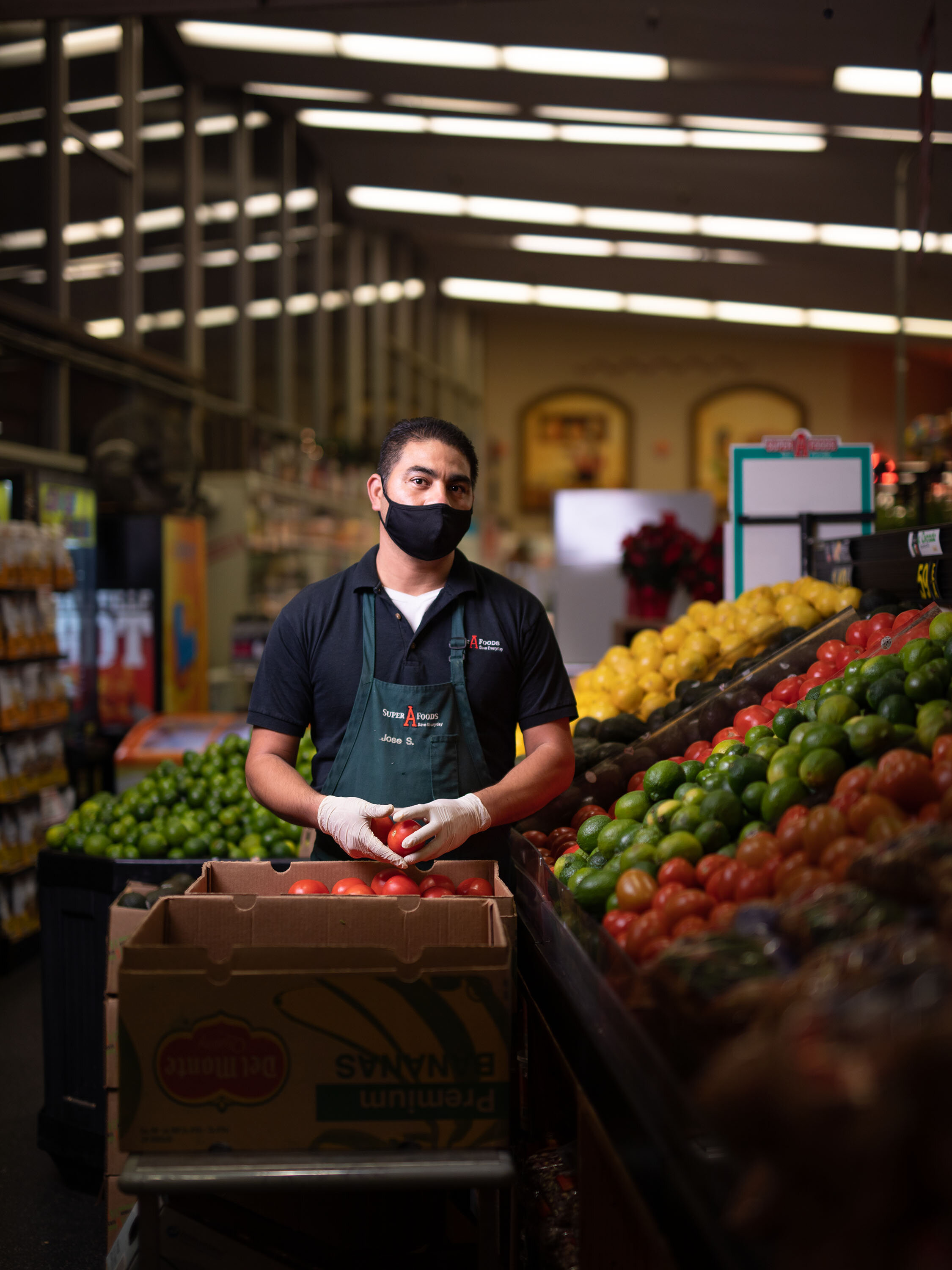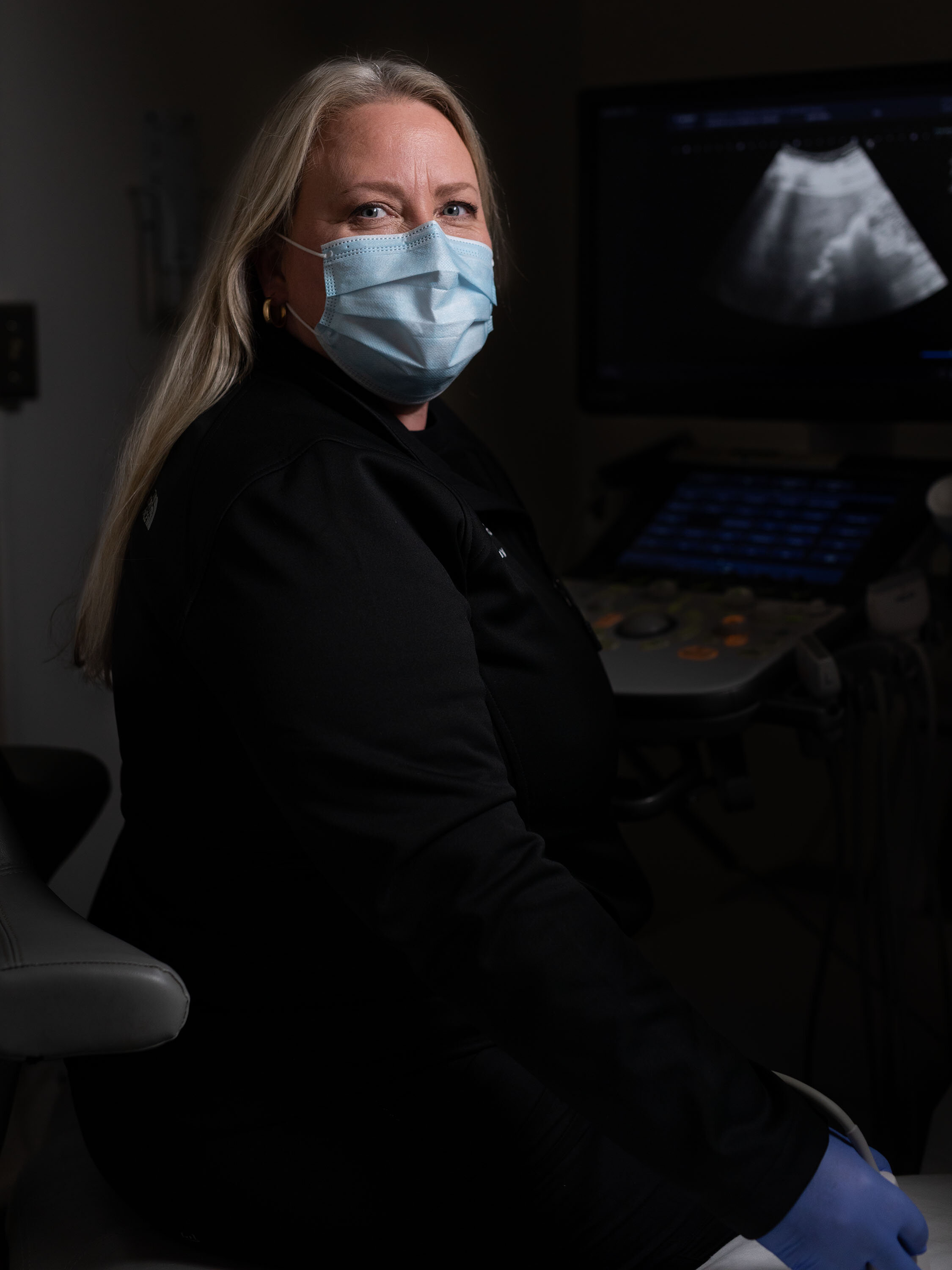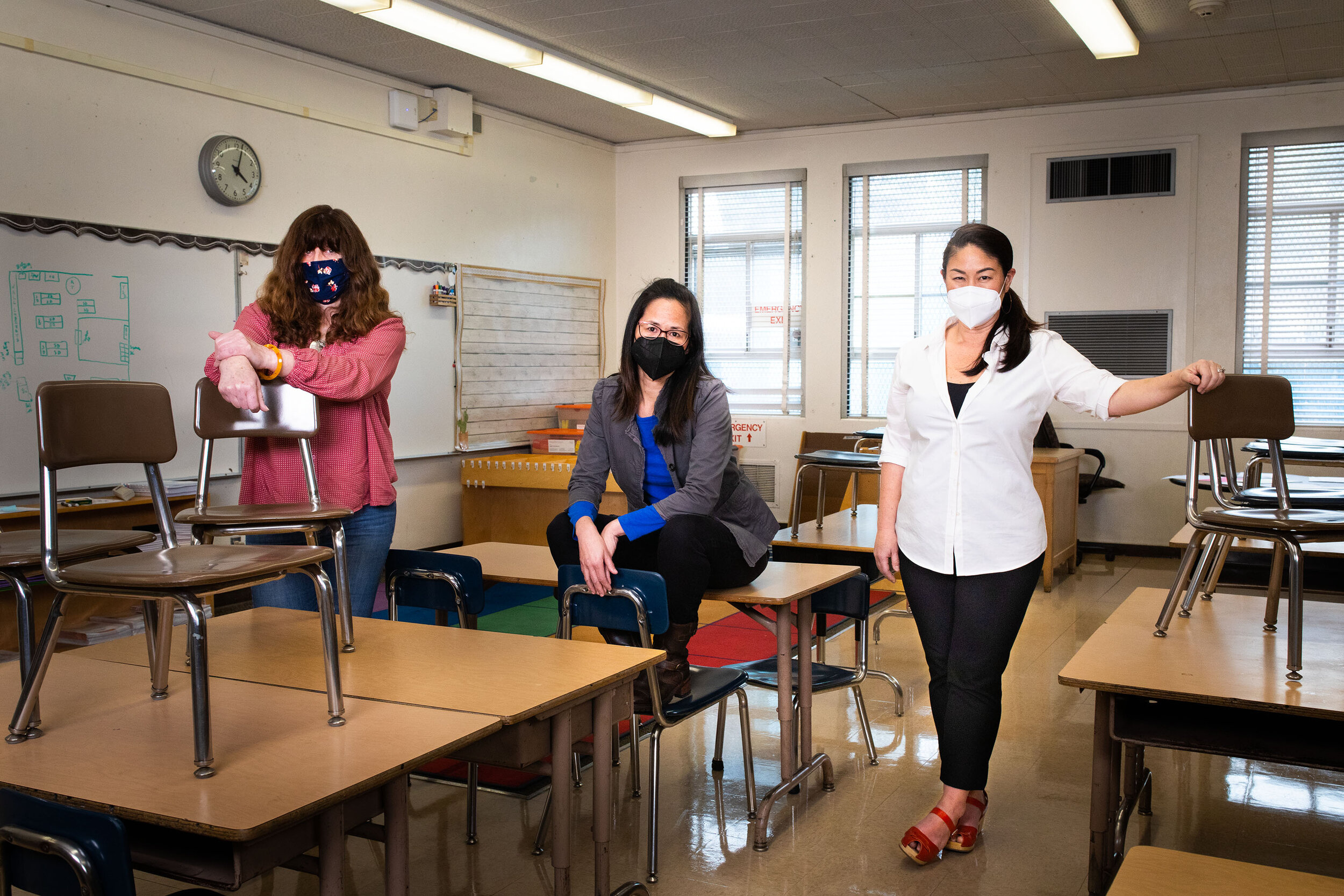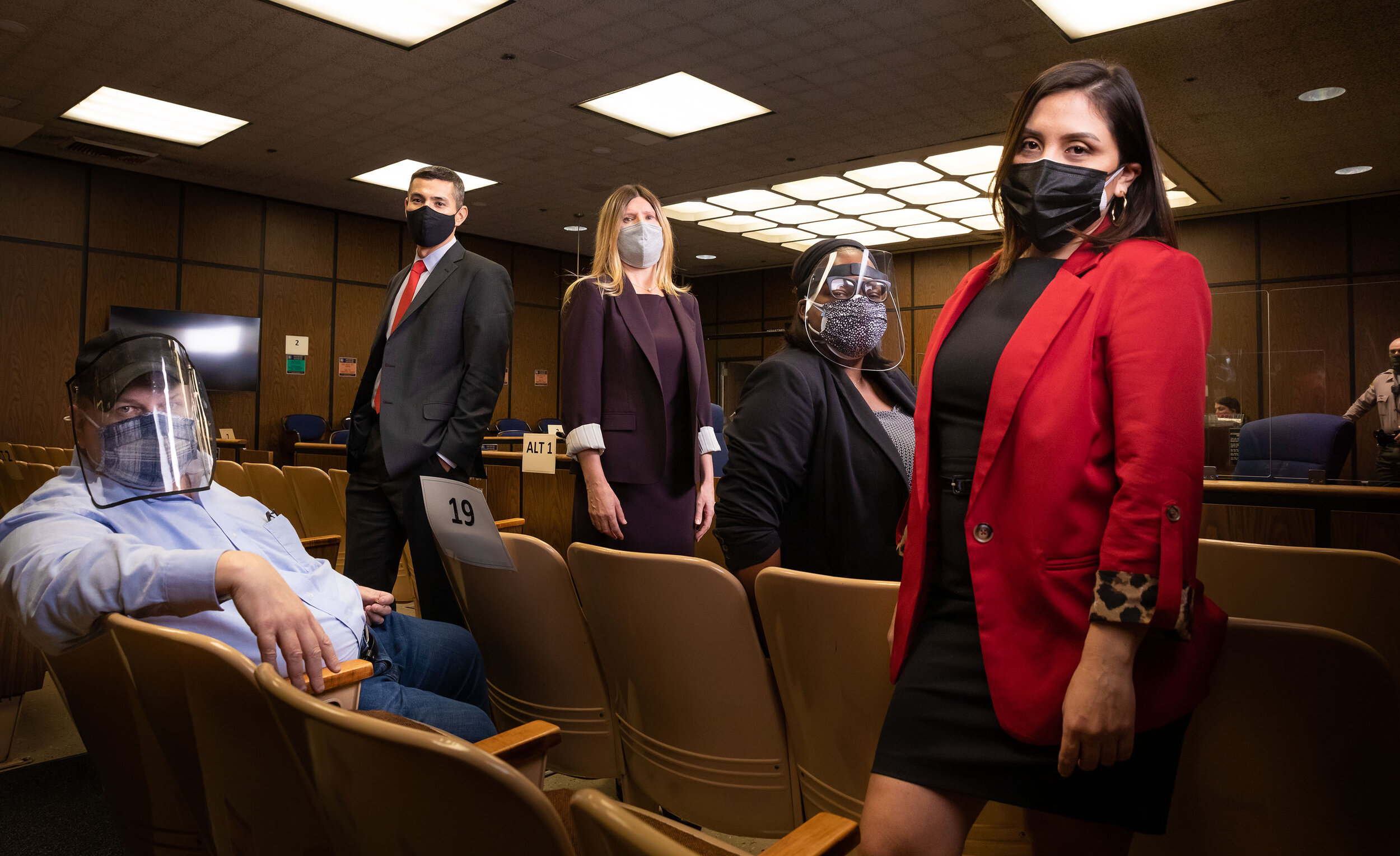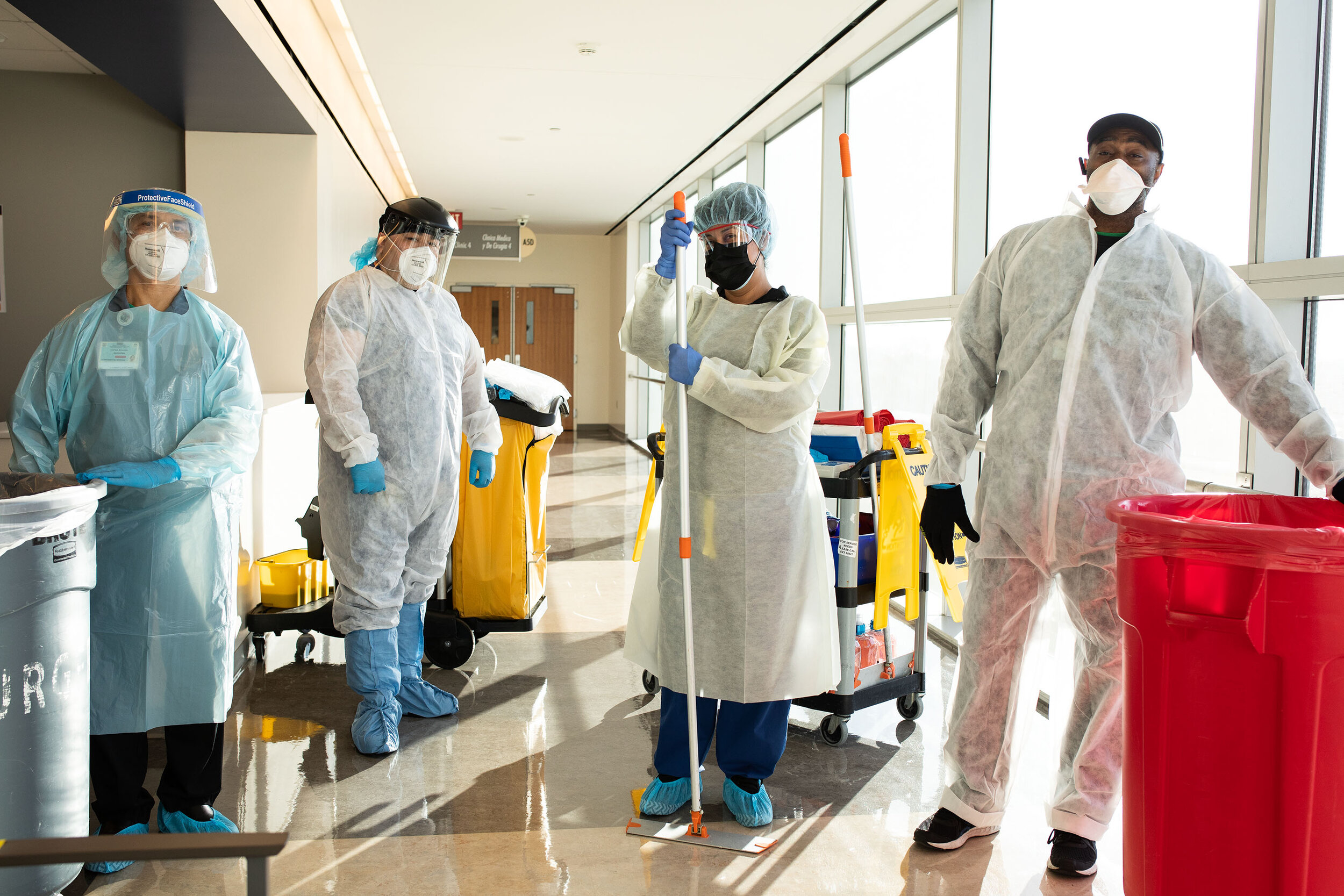The Longest Shift by Sam Comen
One year after the first stay-at-home order of the pandemic, workers who never imagined they would be on the front lines remained on the job.
The portraits and first-person stories in The Longest Shift bring us closer than six feet to the Los Angelenos who worked the front lines of the pandemic. Some are first responders, others suddenly faced deadly risk. Largely Black and Latinx, often in jobs that expose striking inequities, these workers labored so that others could shelter at home while they remained on the longest shift.
This project is a collaboration between more than 20 labor unions, foundations, and nonprofits focused on supporting people at work, with all photography, videography, and reporting by Sam Comen.
Sam Comen lives and works in Los Angeles, California.
To view more of Sam’s work visit his website, view The Longest Shift complete project, or follow him @samcomen
Mauricio Villanueva
Home Healthcare Worker, photographed while at work in his client’s home
“I have to take care of myself, because I know if I get sick or something, I'm gonna lose my job. It’s about trust. If I get COVID and get sick, I understand—I’m 100% realistic with this—that I'm going to lose the job, because even if I recover and I come back, that trust is not going to be there anymore.”
Alberto Gomez
Candy & Toy Vendor
Photographed at Wilshire Blvd and Vermont Ave, on his daily route
“Sometimes there are ladies who can’t afford to buy things for their children, so I cut them a deal. I know it seems like I’m losing, but I don’t lose: I know I win. God is looking at every one of my actions from above.”
Brittney Mull, Amanda Dupre, Joshua Beverly, Ai-Xin Chen, and Filmon Mehanzel
Resident Physicians, Harbor-UCLA Medical Center
When the residents at Harbor-UCLA Medical Center chose careers in medicine, they never imagined facing a pandemic as part of their training. Brittany Mull (left) said, “The hardest part for me was probably the summertime, when I realized that the pandemic wasn't going to be over anytime soon. I was working in the ICU at Cityside for rotation. I hadn't seen my daughter for maybe five days, and my sleep schedule was terrible, and I had to commute back and forth to work. I was really unhappy. At that point, I questioned myself and questioned my choices about going into medicine. I was burnt out.”
Ai-Xin Chen (second from right) moved to California from New York and experienced infection peaks on both coasts. She said, “It's tough seeing so many people die alone in the hospital. It worries me, because I feel like it's kind of dehumanizing to the providers, because I don't know what emotions I'm supposed to be having.”
“I think a lot of us had experiences where we'd wake up feeling short of breath, thinking that we might have caught it. But it was just anxiety about catching it and not knowing what it would do to us,” recalled Joshua Hull (center).
Amanda Dupre (second from left) noted that COVID-19 has disproportionately affected people of color. “I've had family members who actually come to this hospital. I've had family members that passed from COVID as well, so it definitely hit home.”
Her colleague Filmon Mehanzel (right) said, “I appreciate that I was able to even be part of this. I think I’ll be telling my kids, and my grandkids later in the future, that I was part of something that was epic, and how we responded to it.”
José Luis Sanchez Perez
Produce Clerk, Super A Foods grocery store
“I don't know how or when, but I got the virus, and unfortunately I went home and I made my family sick. All my children, my wife and I, and then my in-laws—a family of 9 people. The symptoms were serious, but thank God we got through it.
Sometimes large families of four, five, six people come in at the same time. We cannot scold them or call their attention to it, because they get offended or angry. When this started, people were a little more worried and scared, but now the fear has passed. They are already returning almost to normal.”
Laura Pozos
McDonalds Worker
“We are considered essential workers because of the pandemic, but I think that we have always—our whole lives—been essential people. We are immigrants, and we come to perform a job, wherever they put us, to support our families. Crossing the borders, we face many obstacles, but at the end of the day, we come to work, and to work wherever they place us, doing whatever it is.”
Kristina “Kady” Kepner
LAFD Assistant Chief
Photographed at Station 3 in downtown Los Angeles
“Normally, 85% to 90% of our calls are EMS. The most rewarding part is being able to respond to people, whether they have symptoms of COVID, or they’re injured or sick, and hopefully making a positive impact in their lives. People have gotten really, really sick and are so very thankful for the job that we're able to do.
When the pandemic initially started, we were tasked with developing COVID testing sites in Los Angeles City. We've had to implement new protocols, policies, and a whole bunch of new and innovative ways to continue to be able to do our job and provide exceptional customer service to the communities that we serve.”
Michele Tremblay
Diagnostic Ultrasound Technologist, Harbor-UCLA Medical Center
“I don't think people realize what a personal toll this has been on people—being in the hospital, seeing people that are sick, being afraid, and not knowing when the next surge is going to be and what's going to happen. We never thought we would see something like this, but everyone pulled together, and I think we did a wonderful job.”
(L to R) Josephine Yadegar, Lisa Quon Heinsen, and Lynn Pratt
Teachers, Los Angeles Unified School District
Photographed in the empty San Pascual STEAM Magnet Elementary School
LAUSD schools have been virtual only since Monday, March 16, 2020. When the district made the transition to online learning, it was challenging for the teachers—and their students. Lisa Quon Heinsen (center) has been teaching for more than 20 years. She said, “There have been numerous problems, from inadequate Wi-Fi access to low quality devices that are not able to access the platforms that we use. And sometimes there's the social emotional aspect where kids just feel so alone. That's the hardest part.”
Josephine Yadegar (left), a teacher for 34 years, reminded parents, “I'm not in the physical building, but I'm still with your kids, I still care about them, I still want them to do well, I still want to give them the best that I can every day. The kids are doing the best that they can do in the circumstances that they've been given.”
Lynn Pratt (right) has been teaching for 22 years and is looking forward to returning to in-person teaching. She said, “I have heard criticism about teachers not wanting to come back to work or not doing their job. I've never seen my colleagues work as hard as they're working now, at least 10, 12 hour days. And we still have to balance our personal lives and our families and everything else.”
Jerome Gage
Lyft Driver
Photographed between fares in Koreatown, Los Angeles
“I think Uber and Lyft want us working 50, 60 hours a week, so we won't have time to organize, we won't have time to be active in our community. They want us desperate, poor, weak, and as vulnerable as possible, so we're so reliant on this that we're ready to throw away our soul, our energy, and our health trying to make ends meet.”
Russell Griffith, Mario A. Gonzalez, Marie Geelan, Vanessa Johnson, and Janae Torrez
LA County Public Defenders, Compton Superior Court
“We’re in here every day. I think there's a misconception that courts have been shut down or that courts are not in place, or that we've been on a break. But we've been in here since the beginning. I contracted COVID in June from a client,” said Janae Torrez (right).
Even when precautions are taken, the likelihood of exposure is high. Russell Griffith (left) explained, “The clients are living in a jail, which is a hotbed for the disease, and a lot of them are mentally ill and don't necessarily have the best habits to begin with. And it's very hard for people to keep their mask up, even if they want to, when they're handcuffed.”
Mario A. Gonzalez (second from left) said, “At the beginning of the pandemic, the DAs agreed to dismiss certain cases, low-level misdemeanors, that are not violent and aren't sexual in nature. But as the pandemic has progressed, the caseload has increased significantly, which has been stressful on us.”
During a recent case, Vanessa Johnson (second from right) thought a witness was lying, but the judge wasn’t listening to her objections. She recalled, “The Spanish interpreter asked me afterwards, ‘Did you notice the witness took his mask off?’ I was like, ‘Are you serious?’ I was so focused on the work part that I wasn't even looking at the fact that I could see his mouth.”
Marie Geelan (center) pointed out that public defenders have always had a tough job. “This is another layer of toughness, but honestly, we're up for it. We're doing it, and I feel very proud to have been keeping safe. This is what we do—we get up, suit up and show up.”
Alicia Hill
Nursing Attendant, Harbor-UCLA Medical Center
“Oh, Lord, it is indescribable, it's unimaginable. You can explain this type of stuff to people, and it goes in one ear and out the other. When you're actually here and you see it, then you understand more about the things we go through ourselves by seeing these patients in this predicament.”
Vince Mena, Dale Smith, Kristina “Kady” Kepner, and Brandon Terrazas
City of Los Angeles Fire Department Firefighters, Station 3 in Downtown Los Angeles
Vince Mena (left) has been with the Los Angeles Fire Department for 34 and a half years, but he never imagined doing this work in a pandemic. He said, “We all have to be a little bit understanding, have some compassion, and get through this together, because we are all in it together. It's not just a certain group or certain people; it's everybody in the world, from every walk of life.”
Captain Dale Smith (second from left) said, “We’ve had a couple of healthy firefighters on the job in LA City that have passed from COVID. All the contact that we have within the community definitely raises our exposure levels, which has been pretty tough. We can take all these precautionary measures, but we're not immune to this. It will affect us just like it will anybody else.“
Because Los Angeles County has a public health department, but the City of Los Angeles does not, the mayor asked the fire department to assist with the development of COVID testing sites. Kady Kepner (second from right), Assistant Chief, oversaw that initiative. She shared, “It has definitely been a challenge for all of us, as it has for everyone. We've had to implement new protocols, policies, and a whole bunch of new and innovative ways to continue to be able to do our job and provide exceptional customer service to the communities that we serve.”
Alvaro Altamirano
Port of Los Angeles Trucker
“We are partially responsible for moving the economy, because we move the products that come from other countries and bring them to the supermarkets. We are risking our health, our lives even, but at the same time, we are helping a lot of people. You feel like you are making a contribution to the community, to the country.
Seeing that there were shortages of toilet paper, sugar, food, and things like that, and knowing that we are the vehicle that can reach those supermarkets and restock what is missing; that was a great motivation.”
Kevin Martinez and Charlie Garcia
Security, Harbor-UCLA Medical Center
Kevin Martinez and Charlie Garcia work security at the entrance to the emergency department at Harbor-UCLA Medical Center, where they face new challenges every day. Charlie Garcia (right) explained, “I've seen patients coming in coughing. I've seen patients coming in all wrapped up and wheezing and stuff like that. It's really tough. Some people coming in with COVID need a wheelchair, or they need assistance. We try to help them out as much as we can.”
Kevin Martinez (left) takes pride in being an essential worker, but he acknowledged that the job takes an emotional toll. “It's sad to say, but sometimes we have to send visitors away from seeing their loved ones just to prevent them from being exposed to the virus. When I have to be the one to prevent them from coming in, I look like the bad guy, but I'm just preventing the spread from continuing. It hurts deep down, but there's nothing we can do. These are not our rules. They are the county's rules.”
Philip Quansah
Film & TV Production Truck Driver
“For someone that doesn't know Hollywood, it could be a little puzzling, like, “We're not saving lives, so why are we essential workers?” My thoughts are: Content that is put out on the internet, through streaming, through TV, through network stations, gives people hope. People have lost family members, people have gotten the virus, people have lost their jobs—there's a lot of peril going on. So content, movies, commercials, things that can help people kind of get away, to me, it's essential.”
Fernanda Celarie, Yara Gomez, and Suanne Mendez
TransLatin@ Coalition
During the pandemic, the nonprofit TransLatin@ Coalition has continued to provide critical services for the Trans Latina immigrant community. Fernanda Celarie (right,) PrEP Navigator, said, “Many transgender people have lost their jobs, and they have no support for their housing. We help them with food, shelter and everything they need.”
For Yara Gomez (left,) Community Specialist, the hardest thing about the pandemic is that she can’t express herself with hugs. She said, “We can’t be as close to our clients as we used to be, but I’m grateful that I have a job.”
Suanne Mendez, HOPE House Coordinator, agreed. “Having a job makes me happy, and I thank God that I’ll be able to aid those who need economic resources, food, or a place to sleep.”
Sean Edwards
USPS Letter Carrier
“It's hard labor, you know? You got to get up every day, you gotta make do. You'd be tired and you still gotta get up and come out here and deliver to these customers. It's been a rough year, but you know, I'm just hanging in there. That's all I can do, just be a better person for it, and it is just gonna make me stronger.”
Daisy Flores
Stocker and Cashier, Super A Foods grocery store
“When there were limits on waters, I told a customer, “The limit is only two.” The guy started yelling at me, calling me racist, but yet, we're both Latinos. He just kept yelling at me, so everyone was looking at me, and I got red and I cried, and then another guy came and helped me out. That means a lot, but then I still deal with this every day. I’m very sensitive, and it’s hard.
They say that all grocery people are heroes and all that. Then we should get treated as heroes, you know?
With my mom being sick, if I feel anything, I panic so fast. I am an over-thinker. It's just scary, like, you don't know if it's the flu or if it's COVID.”
(L to R) Carlos Arevalo, Jason Calixto, Esbeida Refugio, and Ray Miller
Custodial Staff, LA County + USC Hospital
The custodians responsible for cleaning and decontaminating LA County + USC Hospital understand that their work is of critical importance. Jason Calixto (second from left) said, “The burden falls on us to protect not only staff, but society, our community, and the public. We have to do everything that we can to protect everybody that comes into the hospital, those that visit the hospital, ourselves, and our families as well.”
For Carlos Arevalo (left), remembered how it felt when Los Angeles was at the highest level of contagion and the hospital was almost full. “I saw the patients face-to-face. I saw some I thought were about to pass, but thank God they started getting better, and they made a full recovery and were able to go back home.”
To keep her two-year-old son safe, Esbeida Refugio (third from left) leaves him with a babysitter during the week, while she’s working. She said, “That's the hardest thing. It's kind of heartbreaking leaving my son, but I'm really scared that he's gonna get exposed.”
Mirna Gomez
Service Deli Chef, Super A Foods grocery stor




